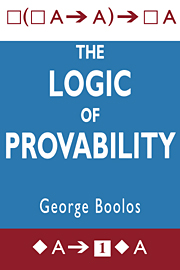Book contents
- Frontmatter
- Contents
- Preface
- Introduction
- 1 GL and other systems of propositional modal logic
- 2 Peano arithmetic
- 3 The box as Bew(x)
- 4 Semantics for GL and other modal logics
- 5 Completeness and decidability of GL and K, K4, T, B, S4, and S5
- 6 Canonical models
- 7 On GL
- 8 The fixed point theorem
- 9 The arithmetical completeness theorems for GL and GLS
- 10 Trees for GL
- 11 An incomplete system of modal logic
- 12 An S4-preserving proof-theoretical treatment of modality
- 13 Modal logic within set theory
- 14 Modal logic within analysis
- 15 The joint provability logic of consistency and ω-consistency
- 16 On GLB: The fixed point theorem, letterless sentences, and analysis
- 17 Quantified provability logic
- 18 Quantified provability logic with one one-place predicate letter
- Notes
- Bibliography
- Index
- Notation and symbols
3 - The box as Bew(x)
Published online by Cambridge University Press: 08 January 2010
- Frontmatter
- Contents
- Preface
- Introduction
- 1 GL and other systems of propositional modal logic
- 2 Peano arithmetic
- 3 The box as Bew(x)
- 4 Semantics for GL and other modal logics
- 5 Completeness and decidability of GL and K, K4, T, B, S4, and S5
- 6 Canonical models
- 7 On GL
- 8 The fixed point theorem
- 9 The arithmetical completeness theorems for GL and GLS
- 10 Trees for GL
- 11 An incomplete system of modal logic
- 12 An S4-preserving proof-theoretical treatment of modality
- 13 Modal logic within set theory
- 14 Modal logic within analysis
- 15 The joint provability logic of consistency and ω-consistency
- 16 On GLB: The fixed point theorem, letterless sentences, and analysis
- 17 Quantified provability logic
- 18 Quantified provability logic with one one-place predicate letter
- Notes
- Bibliography
- Index
- Notation and symbols
Summary
One of the principal aims of this study is to investigate the effects of interpreting the box of modal logic to mean “it is provable (in a certain formal theory) that…”. When modal logic is viewed in this way, a question immediately comes to mind: Which principles of modal logic are correct when the box is interpreted in this way? The answer is not evident; near the end of this chapter we shall say what the answer is, and in Chapter 9, when we prove the arithmetical completeness theorems of Solovay, we shall show that it is the answer.
In order to express our question precisely, we make two definitions:
A realization is a function that assigns to each sentence letter a sentence of the language of Peano arithmetic. It is standard practice to use “*” as a variable over interpretations; we shall use “#” as well.
The translation A* of a modal sentence A under a realization * is defined inductively:
⊥ = ⊥
p* = *(p) (p a sentence letter)
(A → B)* = (A* → B*)
⌜(A)* = Bew[⌜A*⌝]
(Bew[A*] = Bew(┌A*┐), as A* is a sentence.)
We have taken ⊥ and → to be among the primitive logical symbols of PA, and therefore the translation of any modal sentence under any realization is a sentence of the language of PA. Clauses (1) and (3) guarantee that the translation (under *) of a truthfunctional combination of sentences is that same truth-functional combination of the translations of those sentences.
- Type
- Chapter
- Information
- The Logic of Provability , pp. 51 - 67Publisher: Cambridge University PressPrint publication year: 1994



